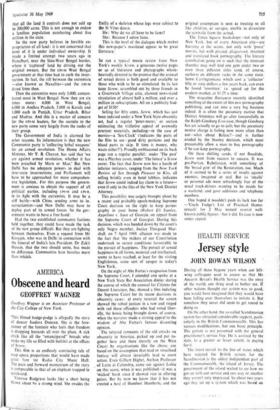Obscene and heard
AMERICA GEOFFREY WAGNER
Geoffrey Wagner is an Associate Professor at the City College of New York.
'This. filmed hodge-podge is allegedly the story of dancer Isadora Duncan. She is the fore- runner of the feminist who feels that freedom is dropping bastards all over the place. A sick chick like all the "emancipated" broads who make my life so filled with bullshit at the offices of Screw.
This film is an endlessly continuing tale of soap opera proportions that would have made great fare for Radio City Music Hall. The pace and forward momentum of the story IS comparable to that of an elephant trapped in quicksand.
Vanessa Redgrave looks like a sheet being blown about by a strong wind. She exudes the
frailty of a skeleton whose legs were subject to the St Vitus dance.
He: Why do we all have to be lions?
She: Because I adore lions.
This is the level of the dialogue which makes this newspaper's masthead appear to be great literature.'
So ran a typical movie review from New
York's weekly Screw, a generous twelve pages or so of literature and photographs whole- heartedly devoted to the premise that the arousal of sexual desire is both good and available to those who wish to be so stimulated. In its last issue Screw, scrambled out by three friends in a Greenwich Village attic, claimed news-stand circulation of almost half a million, and over a million in subscriptions. All on a publicity bud- get of $150!
Selling for fifty cents, Screw, which has just been indicted under a New York State obscenity act, had a regular 'peter-meter,' or section estimating the titillative appeal of avowedly prurient materials, including—in the case of movies—a 'Sex-Clock' (Indicates the parts of the film to see—good dirty portions and the bland parts to skip. If time is money, why waste either?'). Proudly emblazoned on its back page ran a -regular parallel: under The past' was a Playboy cover, under 'The future' a Screw cover. The fact that Screw now has a hassle of inferior imitators, ranging from the New York Review of Sex through Pleasure to Kiss, all selling briskly even in hotel lobbies, indicates that Screw could indeed lay claim to a -future— even if only in the files of the New York District Attorney.
This possibility was largely brought about by a recent and probably epoch-making Supreme Court decision on the right to keep porno- graphy in your home (Robert Eli Stanley, Appellant v. State of Georgia, on appeal from the Supreme Court of Georgia). During this decision, which was handed down by the court's only Negro member, Justice Thurgood Mar- shall, on 7 April 1969, allusion was made to the fact that 'the makers of our Constitution undertook to secure conditions favourable to the pursuit of happiness. The pursuit of sexual happiness in all forms, material and intellectual, seems to have reached, at least for the visiting Englishman, some sort of apogee in today's New York.
On the night of Abe Fortas's resignation from the Supreme Court, I attended and spoke at a New York State Bar Association dinner during the course of which the counsel for Citizens for Decent Literature, Inc, showed a film indicting the Supreme Court for its recent decisions in obscenity cases: at every reversal the screen showed the robed justices in a row and ringed with red those offenders who had voted liber- ally, the house being brought down, of course, when the narrator made a stirring appeal to the wisdom of Abe Fortas's famous dissenting opinion.
The tattered remnants of the old attacks on obscenity in America, picked up and put to- gether here and there (mostly on the West Coast) by organisations like the above, are based on the assumption that read or visualised fantasy will almost invariably lead to overt action. Even Gilbert Highet, Anthon Professor of Latin at Columbia, came out against Lolita on this score, when it was published—it was a 'wicked' book since it showed vice in alluring guises. But by now we know that it has not created a host of Humbert Humberts, and the
original assumption is seen as treating us all like children, or savages, unable to dissociate the symbolic from the actual.
The Times Square bookshops—not only of New York, but of every American city—are bursting at the seams, not only with 'pussy' movies, but with pirated, plagiarised, invented and translated book pothography. The literary
cannibalism going on is such that the itinerant thumber may well find one gem under two or even three different titles (and, Of course. authors) on different racks in the same store. Some Carringtoniana which cost a 'collector' fifty or sixty dollars a few years back, can even be found 'rewritten,' i.e. spiced up for the modern market, at $1.25 a time.
The magazine Ramparts recently identified something of the extent of this new pornography publishing, and ran into a very big business indeed. It is often the pecuniary motive that District Attorneys will go after (successfully in the Ralph Ginsburg Eros case, though Ginsburg has yet actually to go to jail); but the pecuniary motive charge is failing now more often than not—what about Balzac?—and is further eroded by the Stanley decision, which must presumably allow a man to buy pornography if he can keep pornography.
On these shifting sands, if not floodtide, Screw went from success to success. It was pre-Puritan, Rabelaisian, with something of the 'broad grin' of the Restoration, too. Much of it seemed to be a series of insults against enemies, imagined or real. But its 'smalls' or personal ads were refreshingly free of the usual truck-drivers wanting to be maids for a weekend, and gave addresses and telephone numbers.
One hoped it wouldn't push its luck too far —*Uncle Fudge's List of Practical Homo- sexuals' for 2 May named several well- known public figures—but it did. Its case is now under appeal.


































 Previous page
Previous page